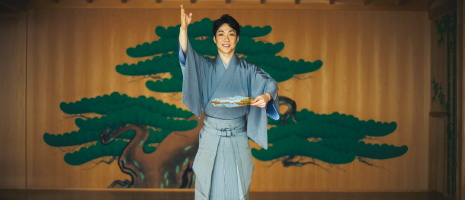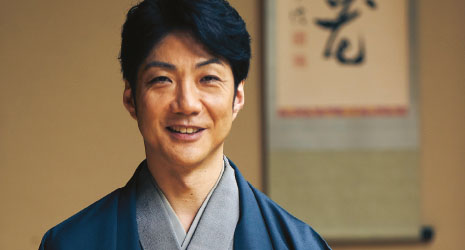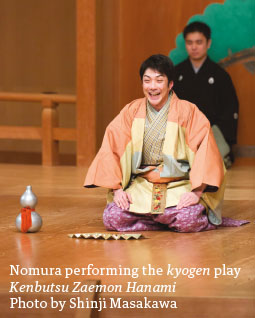Home > Highlighting JAPAN > Highlighting Japan December 2018 > The Art of Emotion: Japanese Entertainment and Hospitality
Highlighting JAPAN



On Stage: Japanese Forms of Expression That Spark Imagination and Understanding
Mansai Nomura is a holder of the Important Intangible Cultural Property of noh theater who has been expanding the world’s knowledge of traditional Japanese theater internationally. The kyogen master—who was named the general manager for the opening and closing ceremonies for the 2020 Tokyo Olympics and Paralympics—shares his thoughts on Japanese forms of expression that enrapture audiences through captivating and innately human performances.
As a master of kyogen, holder of the Important Intangible Cultural Property of noh theater and the general manager of the opening and closing ceremonies for the 2020 Tokyo Olympics and Paralympics, in what ways do you think Japanese entertainment can be considered a form of hospitality?
We’ve spent many days of constant struggle to figure out whether to show the world an easily understood form of entertainment or true art. At the same time, though, it cannot be something too common or too obscure. To truly portray the fact that the Olympics and Paralympics are being held in Tokyo, I think that it is essential that we imagine ourselves in their shoes and find a way for people to enjoy and get a feel for our Japanese identity through these opening and closing ceremonies. While entertaining our audience, there will be some moments to take a breath. It will allow the viewers to get imaginative and relate what they see to themselves through their experiences and memories. I believe this is the Japanese way of expressing hospitality.
Classical theater is not something modern Japanese people experience on a regular basis. For non-Japanese people to understand the world of Japanese theater easily, we’ll need some technology. I have some experience integrating technology and theater. However, while the technology should surprise the audience, it should not overshadow the performances. I believe that leaving some open “space” that stimulates the viewer’s imagination will be an essential part of this event. Within an incorporeal darkness and nothingness something is born, unfolds to fill the void, and then returns to nothingness—the way your viewpoint enters the micro world and then blasts off into the macro world. Flexibility and space allow the performance to reach the viewer’s five senses. These ingenious and resourceful elements are the backbone of Japan’s traditional forms of expression.
What is your main focus while entertaining people, and how do you leave an impression?
Since kyogen and classical Japanese theater don’t usually provide much background information, the performers can add their own flavor depending on their point of view. To improve my understanding of people’s senses and intentions, I pay close attention to my surroundings. Traditional forms of kyogen are actually set forms, and the way the actors showcase their skills within these set forms makes a difference. The way the crowd and the actors at each performance reflect on one another resembles digital techniques, and despite kyogen being a classic form of art, modern people can enjoy live performances of it while basking in the historical atmosphere. The set form becomes a highly effective tool for expressing the character, and by constantly deepening this set form of expression we continue to cultivate the context passed down by our predecessors. I believe this is an essential part of education for those who make their living on the stage, and therefore we do not stop practicing our forms.
Along with your role in the 2020 Tokyo Olympics and Paralympics, what are your upcoming goals?
The Tokyo 2020 Olympic and Paralympic Games are a chance for Japan to show how the country has recouped after the natural disasters it has suffered over the past few years. The original idea behind the Olympic and Paralympic Games was peace. I believe we should highlight the power and strength of this life we have inherited from our predecessors. In Japan, there is a strong belief that festivities are both a requiem and a new beginning. While preparing for the Olympic and Paralympic Games, I’m thinking of the roots behind the will to live. While there is a lot of pressure, I’d like to use that as an opportunity to energize my performances.
© 2009 Cabinet Office, Government of Japan






